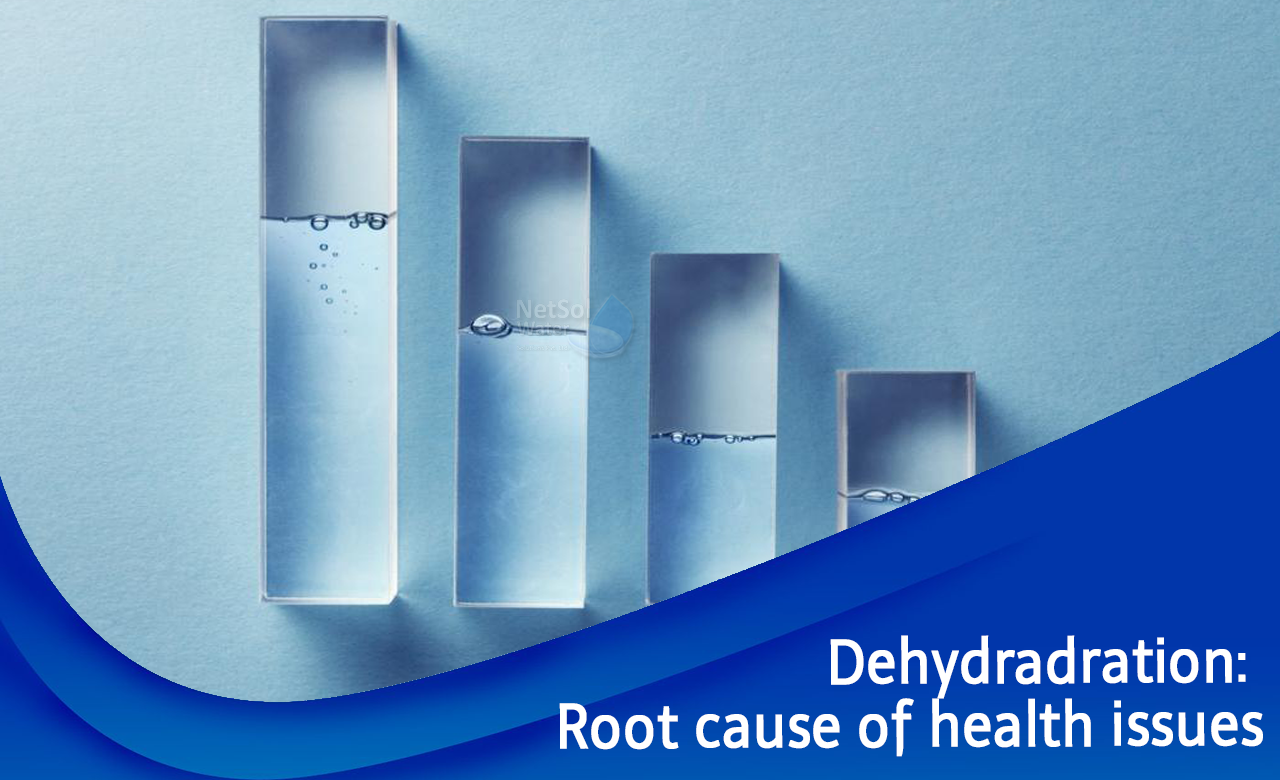Dehydration Root cause of health issues
When your body loses more fluid than you drink, you get dehydrated. When the body loses too much water, its organs, cells, and tissues stop working properly, which can lead to serious consequences. Dehydration that isn't treated right away can lead to shock. Dehydration is a condition that can be moderate or severe. Mild dehydration is easily treatable at home. Severe dehydration requires treatment in a hospital or emergency room.
How can dehydration manifest itself?
Sweating and urine are two ways in which your body loses water on a regular basis. You will become dehydrated if the water is not refilled. Dehydration is caused by any scenario or condition that causes the body to lose more water than usual.
How can you know if you're dehydrated?
Dehydration symptoms vary depending on whether the disease is moderate or severe. Dehydration symptoms may appear before total dehydration has occurred.Mild to moderate dehydration causes the following symptoms:
- Fatigue
- Mouth that is dry
- Thirst has grown
- Reduced urination
- Tear production is reduced
- Skin that is parched
- Constipation
- Dizziness
- Lightheadedness
- Headache
In addition to the symptoms of mild dehydration, severe dehydration is likely to cause the following:
- Excessive thirst
- Lack of sweat production
- Low blood pressure
- Rapid heart rate
- Rapid breathing
- Sunken eyes
- Shriveled skin
- Dark urine
Many individuals make the mistake of drinking an ice-cold soda or an energy drink instead of water, but these beverages might actually make you dehydrate even more.
The following are 10 dehydration dangers to be aware of for yourself, loved ones, and pets:
1. Muscle Cramps- Muscle cramps can affect anyone, not just athletes. Those who are inactive and don't drink enough water are also prone to cramping. Hypersensitivity and involuntary muscular contractions are caused by dehydration.
2. Depression- The brain requires more water than any other organ in the body, at 85 percent. A lack of water in brain cells can cause an abrupt decrease in the brain's energy supply, resulting in exhaustion, lethargy, and depression.
3. Constipation- Food is broken down in the small intestine after it is consumed, and the non-essential component is transformed to waste. Constipation is caused by dehydration, which causes the intestinal cells to suck water from the dietary waste in the intestines, causing the waste to become hard.
4. Hypertension- People who are chronically dehydrated are more likely to have high blood pressure. The brain sends a signal to the pituitary gland to secrete vasopressin, a hormone that causes blood vessels to constrict, when the body's cells are dehydrated. As a result, blood pressure rises, resulting in hypertension.
5. Kidney Stones- Dehydration causes urine to become concentrated, causing minerals in the urine to crystallize and form kidney stones. Kidney stones are formed when these crystal forms deposit in the kidneys.
6. Uremia- Having enough water in the body makes it easier for the kidneys to filter waste while diluting urine. Due to a lack of water in the body, the kidneys struggle to separate appropriate amounts of waste from urine, causing waste that should have been expelled to become trapped and cycled throughout the body.
7. Gallstones- Dehydration can cause bile ducts in the liver to contract, similar to how blood vessels compress. Gallstones can form as a result of these contractions.
8. Kidney Disease- When your body is dehydrated, your kidneys restrict urine production, causing capillaries in places like the heart and brain to tighten, resulting in high blood pressure.
9. Joint Complications- Dehydration causes cartilage in joints to rub against one another, weakening and wearing them out over time. The cartilage, however, can be healed with enough water and the production of new cells. Due to a lack of water, the regeneration of these damaged joints takes longer, and the cartilage can wear out completely over time.
10. Death- Water accounts for roughly 60% of the body's overall weight. To be active and healthy, every physiological function and process requires water. Because severe dehydration can be fatal, it's critical to pay attention to all of the other warning signs and symptoms and take action to address them!




